Premiere: Merely - "I'm Your Lover"
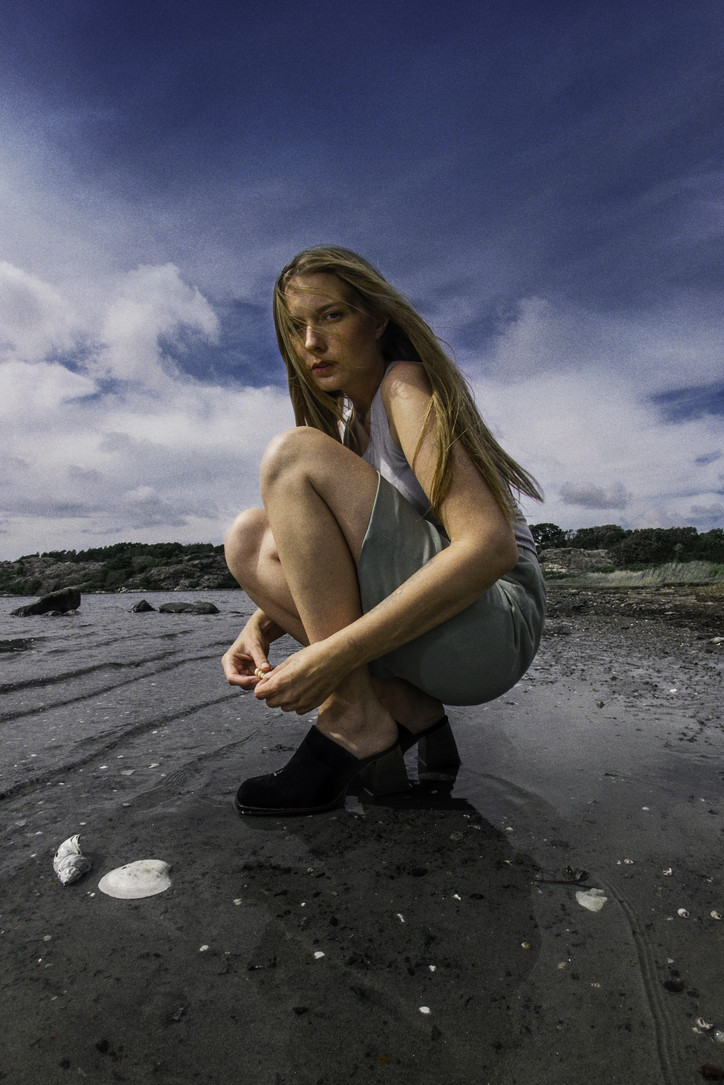
It certainly does have a direct and pop-y vibe, but still keeps with the artist's mystical energy. This song will make you fall in love, if not harder and faster with your lover, then with Merely.
Listen below.
Stay informed on our latest news!

It certainly does have a direct and pop-y vibe, but still keeps with the artist's mystical energy. This song will make you fall in love, if not harder and faster with your lover, then with Merely.
Listen below.
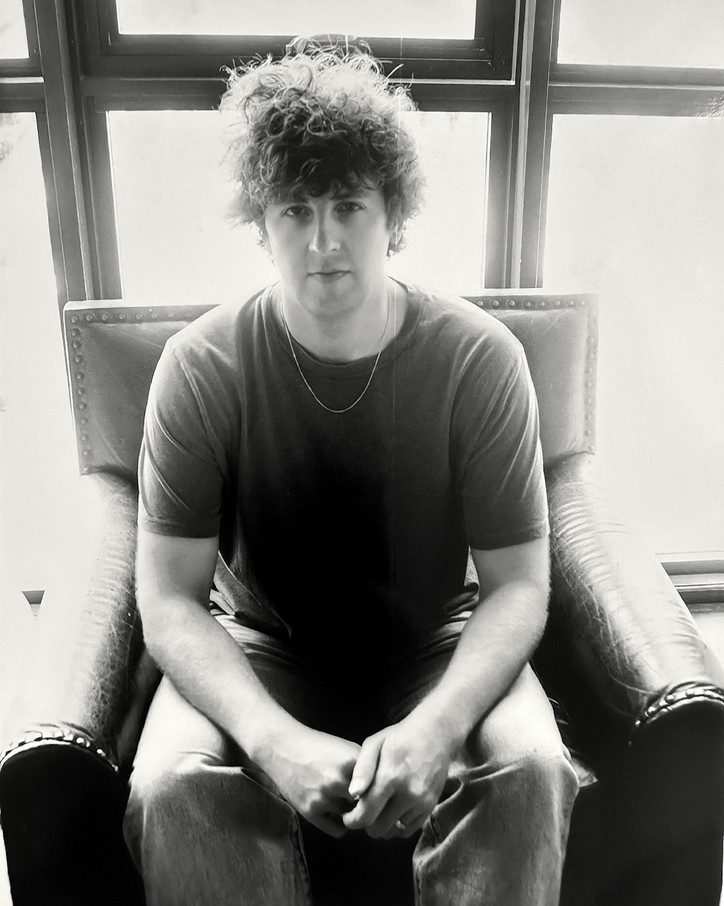
In Waves dares you to dance. It oozes PMA and at the same time makes you question where Jamie xx’s head was while he made these tracks. What does it mean to be inspired? What experiences move us to create and from what place? Bottling up happiness is seemingly much harder than showing our scars. For Jamie xx, duality is key and as he enters this next chapter in his career, he finds himself begging the question, what happens when you don’t have to choose?
Lindsey Okubo— You played a killer show for the opening of The Floor in Brooklyn in July! Naturally you started the residency in your home of London but since bringing it to other cities, New York being your first next stop, I can only imagine how it must feel to actualize your dream of having your own space, your own club.
Jamie xx— I mean, it's been amazing, it’s been better than I dreamed of. I guess I was a little naive before it was all happening about what it means to have your own space and play there every night but being able to meet all these younger DJs that are killing it along with the older legends, some people I know, some people I don’t — it’s all been very inspiring, but it's also been very exhausting.
I can only imagine! That being said, the state of being inspired for an artist often ebbs and flows, even if they’re still making work, and I’m wondering how you keep that sense of inspiration alive and how it’s changed? We don’t realize how rare those moments are and cultivating them becomes more of an outlook than anything.
You always have to put yourself out of your comfort zone, really, at least that's what I find. I'm very happy making music on my own and being in my studio alone and that gets me to a certain point, but I always have to push myself and push the limits of what I'm comfortable with. Every time I think something's finished, I always have it in my head that it could be better, which is not the most satisfying way to live but I think it's also the best way to make good art.
In the past when you were making music with The xx, people used words like “brooding” to describe the music. Creating from a place of pain or sadness is often said to be easiest because you’ve already been pushed to the edge and ironically or not, it’s sometimes harder to be inspired by joy and to capture that feeling – but dance music seemingly does that. The new album radiates such positive energy, is it reflective of your lived experiences as of late?
I mean, I try not to overthink it. When I'm making music, the best stuff comes out when I'm in a very free space mentally. I'm letting mistakes happen, doing whatever's going on and just being in a bit of a flow state. Whenever I've thought too much about the music that I'm making or gonna make, it doesn't end up being very interesting. There's a certain emotion or feeling that I get when I am making something that I love and I think that translates into the music and vice versa. I find it very hard to put my finger on it but I think that's part of the joy of it as well. It's the searching for those moments that then become the piece of music in the end.
Your music has always been quite abstract and as a result, it resonates on a bit more of an emotional level which makes me think of what you’re saying about being in a flow state, having that sense of freedom. In words, what does it feel like?
It just feels like time slows down while simultaneously going extremely quickly, I lose days in that state. Sometimes it's great and you feel very happy at the end of the day and others you've made something that sounds insane because you've been in this wormhole of being creative and are unable to zoom out. Either way, it's amazing to be able to just do that and sit for a day, to make music and be creative and follow these weird trains of thought.
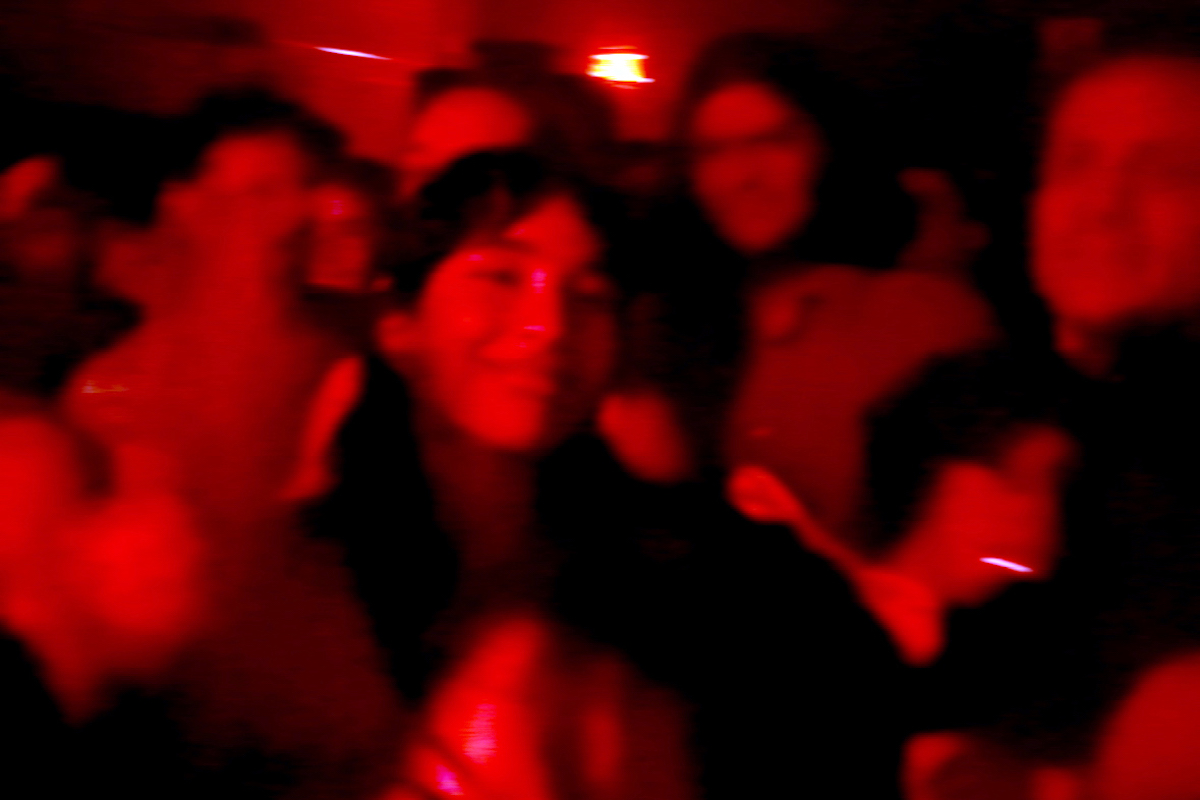
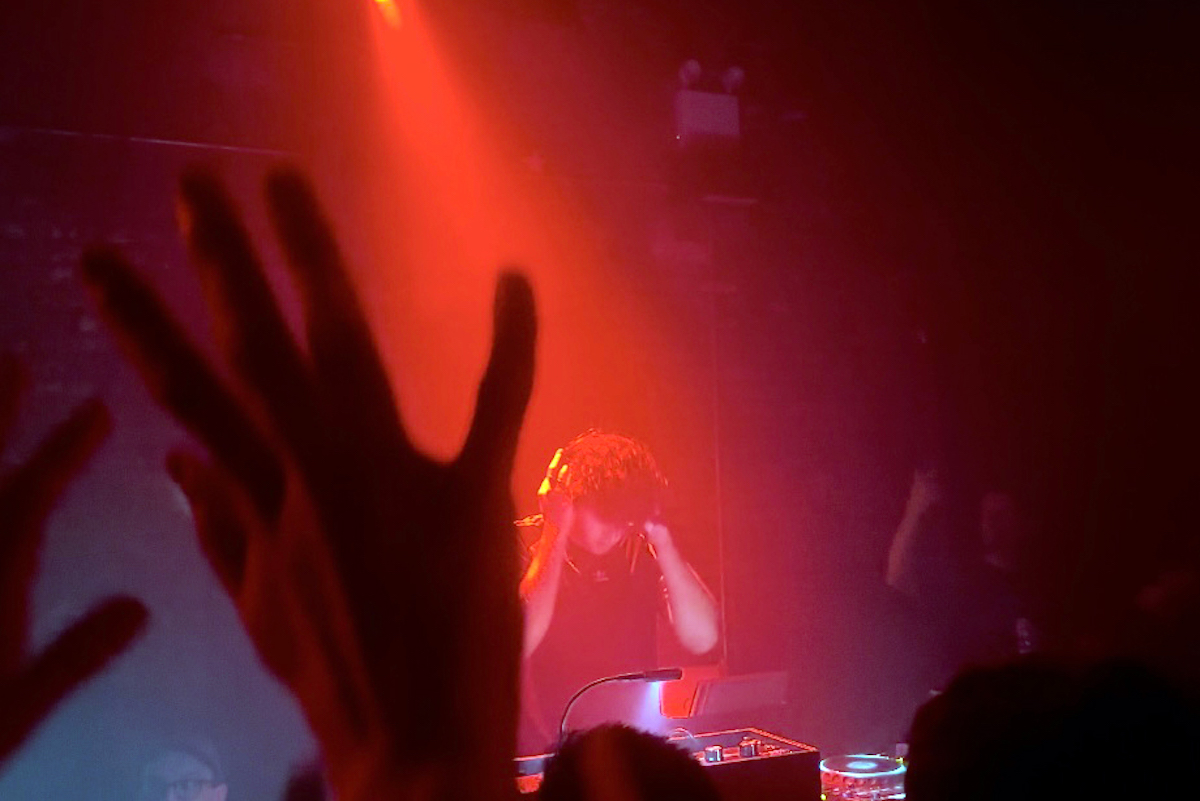
Absolutely and between now and 2015 when the last album came out, inevitably so much has happened, changed. For you I can imagine that maturing has meant finding your own voice? The music seems more assured and in the past you’ve said you weren’t keen on playing your own stuff on stage but that feels different? Can you speak to the in-between, then and now?
Just like anyone going from being 25 to being 35, you have massive changes or growth. You become more confident in yourself, you know what you like and what you don't and how to live your life in a way that is sustainable for you. So for me, all those things bled into being able to make music and in a more balanced way and better way and I guess that seeped into the album.
It's interesting when you say the word sustainable. I’ve been mulling the word over a lot recently and feel like it’s really the key to having a long and fulfilling career. These ideas of success and fulfillment as they pertain to our careers are actually very different and I’m wondering what sustainability means for you creatively and as an artist?
Well, I think one of the things I've realized over the last 10 years is that I'm so grateful to be able to do this; and to be able to be at this level where I can play really big shows, people know my music and I get to travel around the world but I can also play really small shows like The Floor, and connect with people in that way. I can also just walk around the street and nobody knows who I am and have perfectly normal time. I'm not really striving for anything bigger than that. I just hope that I get to keep doing what I'm doing in a similar way for as long as possible, as long as people want to hear it. I'm just very happy with where I am.
Right, that duality is important so you don’t feel stuck in one mode of operating. That being said, I know everyone's been talking about The xx getting back together, an event that kind of lends its hand to that same idea. You’ve all been able to preserve your relationships and make your own paths. The idea of “going back” to something comes with a lot of yearning but very rarely are we truly able to, what’s the emotional toll of that?
It was about all of us going out, doing our own thing so we could make something new and fresh. By being able to bring in new ideas after having put ourselves in different scenarios, the next album can be better and we can enjoy it more because it's more of a challenge. It’s tricky because when we come back together, we are further apart as human beings as well as musically and it's going to take more to make music that we all love again together. I've really enjoyed just hanging out with them again and jamming. We've made lots of things, some better than others and we all are in quite different headspaces about the music that we're making but I think that was the point of it and we're just at the beginning.
When you say, making it “better,” how are you guys personally defining that? To what extent does the music have to reflect growth or the experiences that you now have under your belt?
It's really hard to say because we haven't really even properly begun the hard work of making an album. For me, it means a better process of working, better living. I've been surprised by how much I'm enjoying the back and forth of working with them and how unprecious I am about anything. I'm very excited that any music that we make could be for the band at the moment and it can sound like anything. They may not necessarily feel the same way, but at least that's my idea of it at the moment.
Right and the bit about being unprecious, that must feel good. The world is such a different place today from when you guys started out in the early aughts and I feel like with social media, this idea of putting anything out there can feel so contrived at times or subconsciously inhibited by self-censorship.
Yeah I think having done this for a long time, it's just really nice to not feel like that all the time but I'm sure it will come in moments, you can't get away from that. If you want something to be good, you have to have those moments but I'm very glad that I get to sort of zoom out now and see how nice it can be and look forward to getting into the nitty gritty of the process.
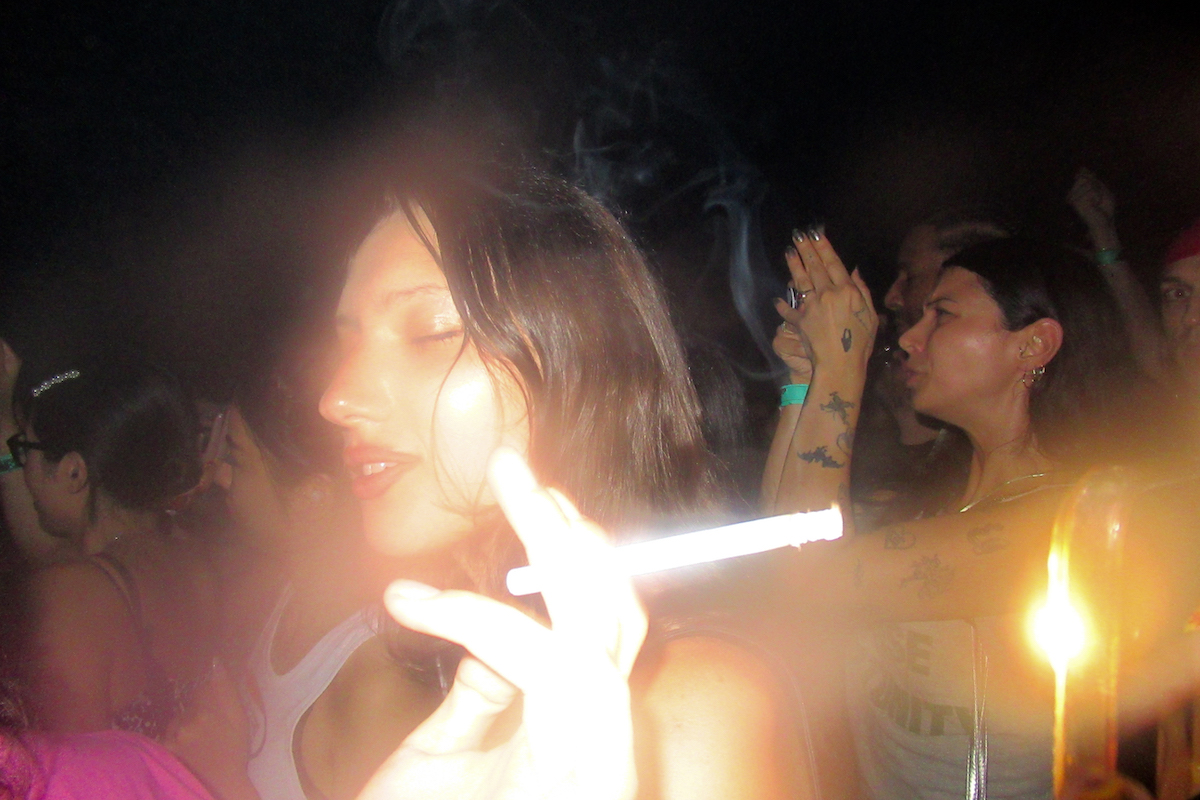
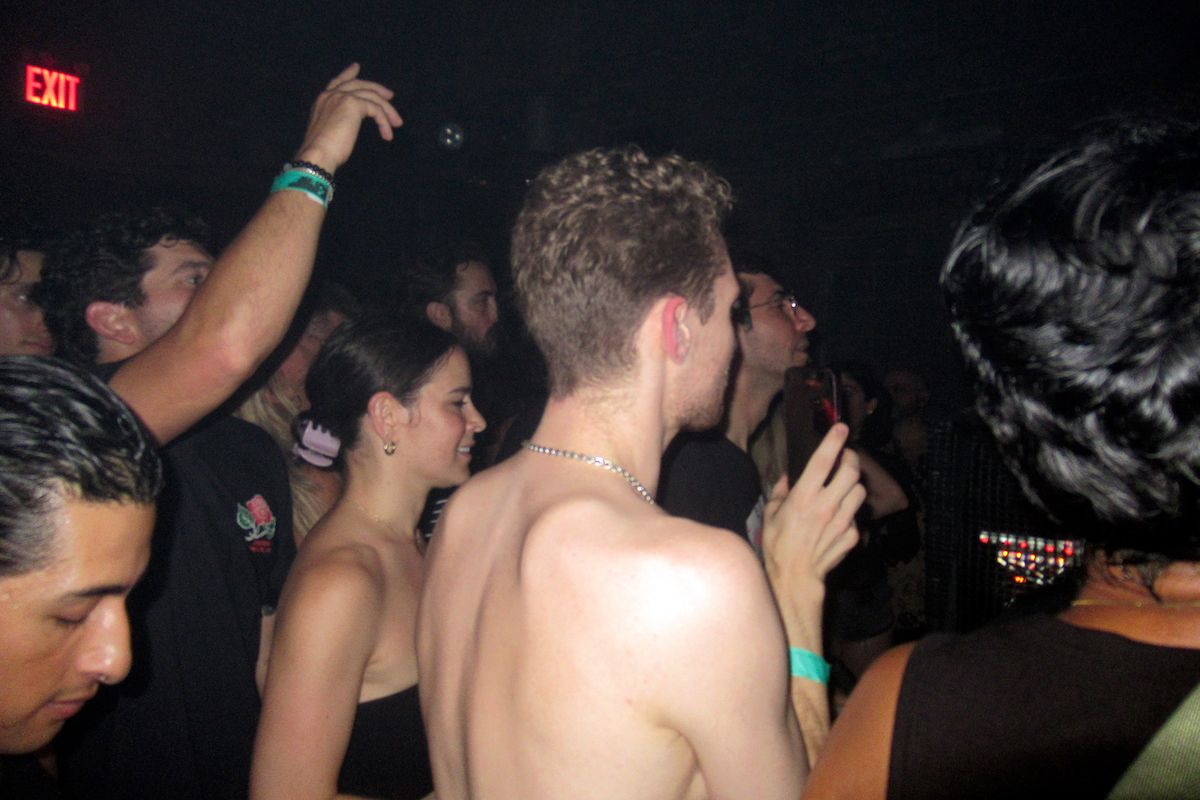
When you say being able to zoom out, do you feel like that's kind of just something that perspective essentially comes with time or how do you think you got to that point? Because the world of dance music has really changed, we’ve seen DJs reach a new level of pop stardom and cliche and going out is about escaping, hedonism, lack of accountability. Yet, with your music and The Floor, you’re striving for a sense of presence. On the “breather” track, you’ve got some meditative voiceovers and it’s interesting to ask that of the audience.
Yeah, I think it's exactly that. It’s definitely changed over the years and some of the stuff that I struggled with over the making of this album was related to how it's changed. Thinking about what influence my first solo album had on dance music to where the scene is at now makes me realize how scenes grow differently than how they used to when I was a kid. In the end, I just had to sort of put blinders on and do exactly what I wanted to do, regardless of everything else because it was really messing with my head. The Floor is the antithesis to the giant stadium shows with everyone with their phones out. It's a small 300 capacity room. It's too dark for you to want to have your phone out and that's my favorite kind of thing to go to. I also try not to be too negative about it and there's a lot of people who connect with the music that I connect with now. Some of the more emotionally driven dance music nowadays feels a bit forced to me, as if it's not really coming from the heart but I also think there's enough space in the world for everybody to make and play whatever they want to.
Totally and thinking about cities as scenes, how was the energy in New York versus in London?
The energy was amazing. Even from night to night, the energy was totally different every night in both London and in New York. I love that about spaces, they transform every night.
It reminds me of something you said in a past interview – that dance music has the potential to be more radical than anything else – it’s unfixed. Hearing that now, where’s your head at?
It comes down to a basic instinct, not to get too serious or earnest about it, but humans have always been communicating through dance, there was always a need for it. Before an abundance of dance floors, it was a church and before that, people were banging wooden sticks in caves and dancing around to that. It’s how we've excised our demons since before we could speak in that way, it's always going to be around, you can do anything with it, it has endless possibilities because of that.
Endless possibilities meaning an infinite number of ways to find connection? You’ve used that word “connection” quite a bit, when do you feel most connected?
I felt that on Thursday night when Francois was playing in New York. I just had an hours long chat with him before his set and we were talking about similar things to what we've been talking about – the state of dance music, the different ways in which it goes and how he's experienced that since the start of his career, which was a lot longer than mine, and we have very similar feelings about all of that. Going to the dance floor to then watch him play and to see the room come together and be uplifted by his set, it was just a beautiful thing. It was very invigorating and super inspiring. I felt that connection more than I had on the other nights, even though the other nights were amazing, there was testament to the fact that you can get that good by doing it for that long and he’s done it for 50ish years.
That’s sustainability right there. I don't know if you struggle with this at all but I think there’s something to balancing how you perceive yourself, as an individual and/or as an artist. How far away are those terms in degrees of separation, if at all?
I think I'm constantly trying to figure it out. I'm trying to be as grounded as possible and I think that the answer to being like that is to not really think of yourself as an artist or it being any different from having any other job. Over the last few years, I've enjoyed treating it like a job, going into the studio no matter what, even if it wasn't working, trying to do a nine to five while giving myself the freedom to stay up for two days, if it's going well. Sometimes it works, sometimes it doesn’t but there are very few other professions where you get to have that workflow and it’s not to be taken for granted. I definitely don't walk around thinking of myself as an artist the whole time.
That’s interesting, you’re kind of chasing that flow state, feeling that connection while having to come back down and live in the sometimes mundane reality of things. That being said, music has kind of taken you around the globe throughout your youth and into your adult years, but I feel like home is something that also seems to be very important to you. What does home mean to you?
I think it's just the simple things it represents like having a routine, getting to see my favorite people, going to my favorite park – the things you start to take for granted. If I'm in one place for too long, I used to get restless but I'm really starting to cherish all of these little things again. It's all the stuff outside of music, really, that home represents and I think my perspective on it has changed slightly. I used to miss home a lot, I used to make music based on that feeling and now I think music is this totally international thing. I love traveling for music, getting to be in all these places and see the world and healers of new music and home is kind of a sanctuary away from that.

So why this band, and why now? What has resonated so deeply? As I learned, julie's three members — Alexandria Elizabeth (vocals and bass), Keyan Pourzand (vocals and guitar), and Dillon Lee (drums) — control nearly every aspect of their creative vision. Though all in their early 20s, they boast an impressive range of skills. A glance at their side projects and Tumblrs reveals their diverse artistic interests, spanning collage work, graphic design, poetry, architecture, and more. During our conversation, julie explained how they maintain full control over their albums — from crafting the sonic palette to making the album art, choosing collaborators, and directing their own videos. It’s a crash course in authentic creation, blending music history and the avant-garde with virality and mainstream success. Read my full interview with them below.
office— What is the last dream you remember vividly that stuck with you?
Alexandria Elizabeth— Gosh. I wrote this down. It was on tour. Okay, so I threw a party at my mom's house — my childhood house. A lot of people came, and it was really crazy. The house got destroyed, and the entire back wall was blown off. When my mom came home, she wasn’t mad, but she was really matter-of-fact. She said, "Bro, don’t throw parties here because you always end up blowing off the back wall." And I was like, "What the heck?" It was so strange because I blacked out between the party ending and my mom arriving. I wasn’t super guilty, though, because she wasn’t upset, just... practical about it.
Do you guys think dreams have unconscious meaning?
Dillon Lee— I think they definitely do.
AE— I was just reading Carl Jung on dreams during this tour.
DL— I keep having these recurring stress dreams where we're setting up for a show, but it takes forever to set up my drums, and the crowd is just waiting there. It’s so slow, and everything is delayed. I also get bug stress dreams, where oversized bugs are chasing me. It's pretty gross.
How did you guys all meet?
DL— Keyan and I went to high school together. We became friends through a mutual connection, and we started playing music together in my kitchen, just messing around. We both had similar interests in music. Then we met Alex.
AE— I saw Dillon around the Orange County scene. He dressed really sick and stood out. We had mutual friends, and he played in one of my friend's bands for a while. I didn’t know about Keyan until Dillon DM'd me like, "Wanna be in my band?" I was like, "Okay." I met Keyan when I came to his house, and he helped me get my bass out of the car. I remember thinking, "Oh, they’re so cool."
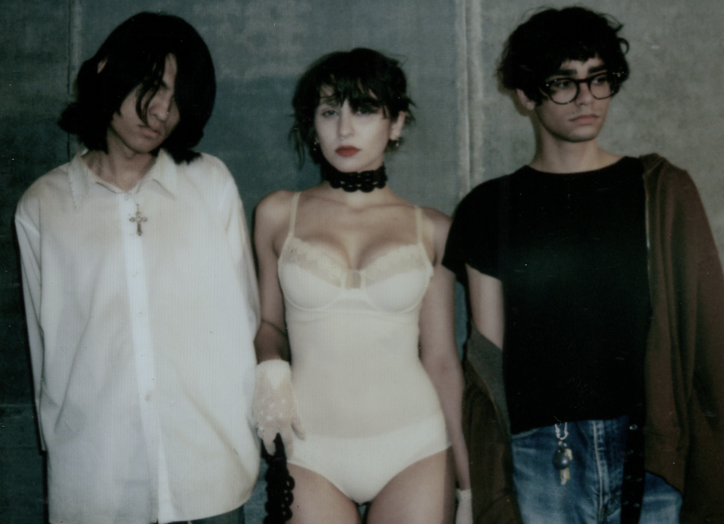
How have you grown as friends and as a band in the past couple of years?
Keyan Pourzand— It went from best friends to family. We’re like siblings.
AE— We're all really annoying all the time.
KZ— For better and for worse. We'll argue with each other like crazy. And then we'll make up five hours later.
DL— Sometimes it means nothing because it's just arguing with your sister.
Do you guys fight about stupid shit, or like “Oh, I don't think we should put that much reverb on this.”
DL— Stupid shit. And then also, well, that's [reverb] also kind of stupid shit.
AE— I remember at the boxing ring before we played we really got into it about Dillon's drum kit and whether it should be five inches forward or back. And for some reason we were really pissed. We were all fighting.
KZ— I was like, bro, why'd you do that? I put the amps back there for reason.
DL— And I was like, whatever.
AE— And then I was mediating it.
When it comes to your stage presence, is it planned, does it come naturally?
AE— Mostly natural.
DL— We definitely do talk about performing on stage and try to be intentional with it. It's not like it's choreographed when we play the show, all of that's in the moment, but we do think about how we set up the amps on stage and such.
As artists, how much do you want to communicate with the audience? I've seen performers that don't say a thing to the audience, and then others that are yappers. They're doing crowd work. It's like standup for them.
AE— It's not in me. I can't work a crowd in a comedic way. I can sing though.
Do you improvise on stage?
AE— We'll extend certain songs or in between the songs we'll do these interludes and play off each other's noise. We’re pretty much making soundscapes.
DL— Most of the improvisation comes from in-between the songs when we have samplers playing. And then just trying to play with whatever we're hearing mixed with our instruments in a very minimalist way.
Dillon, have you always drawn, and when did you start?
DL— I've been drawing since I was three or four years old. When my mom was my age, she went to art school and she would always have her drawings hanging up. Originally that's what I wanted to do as a career at first because my mom got me the Gorillaz's Demon Days CD and I thought those characters were so sick. I wanted to make people's album covers for a living.
When did you first doodle the character in the cover art?
DL— When I created the first Macy drawing, I was in my English class in high school and wasn't doing it intentionally. I didn't think, This is going to be for my band.
AE— Our friend was always like, Bro, she's so fire.
DL— In a vague sense, this girl seemed like a highly appropriate representation for what I wanted to communicate at the time. Eventually we used it for a lot of art when we first started putting out music and then it became pretty seamless.
Do your other disciplines and artistic mediums, like your architecture studies, influence your song structure?
KZ— A lot of what you're taught in architecture school is balance in structure; how to carefully craft the composition of what you're creating.
AE— In art design and music theory in general, which is what I was formally educated in, a big thing is the idea of a repeating thematic element that recurs throughout a piece of work. We talk about that when designing buildings, but it’s also very common in music, like when there's a certain melody or theme that keeps coming back.
KZ— That's how you make a song!
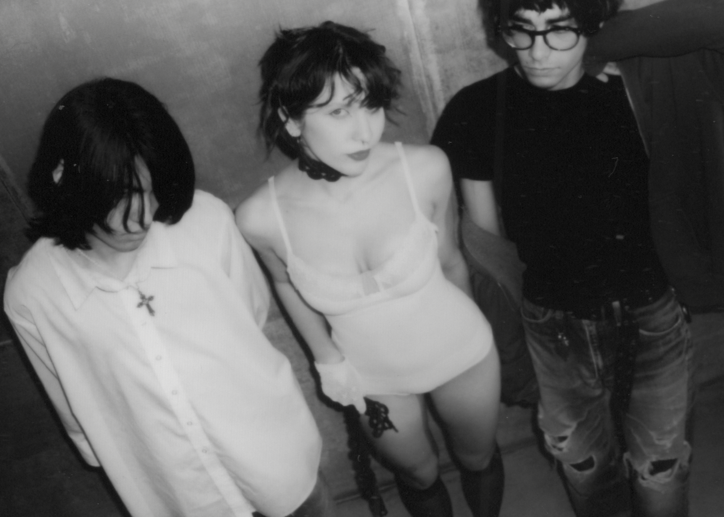
I noticed that the song structures on the new record are really varied.
DL— Yeah, that was intentional. I think it's interesting when I listen to certain music and the song structure feels like this rollercoaster, but it also doesn't feel like it's just getting away from you or falling apart. I like when it's done in a good way, and it goes to a lot of different places, but still feels congealed into this singular thing. We wanted to play with that.
Let's talk about "Feminine Adornment". It's one of the only ones on the record that’s just Alex singing. What does the title represent?
AE— The title was an excerpt. I was reading Anti-Oedipus by [Giles] Deleuze. It was a random quote that I really liked — it was actually the full title before. Throughout my life, I’ve played with masculinity and androgyny in my fashion and how I portray myself. But recently, I went through a phase where I was drawn back to femininity after a year of avoiding makeup or anything feminine. Doing those things brought me a sense of peace. It wasn’t about trying to achieve femininity but about self-soothing. I found myself reaching for feminine textiles, sewing, creating things, makeup — those processes became comforting. I wish I could find the full quote.
It'd be cool if you did the Fiona Apple thing and made the title a giant poem.
AE— I would love that vibe.
You've mentioned that image branding and music hold equal importance for you. Do you think this ever detracts from the music and artistry itself? And does it affect your creative process?
KZ— No, it just takes longer for us. That's why our timeline—besides the fact that we were in architecture school — takes so long. We're making music and art simultaneously, putting equal effort into both.
Do you think about how to package and present it before, during, or after creating the music?
KZ— During.
DL— Yeah, definitely during. Like Keyan said, that’s part of why it takes so long. Everything is really thought through. Perception, image branding, all of that is important. We don't want to be misrepresented.
Would you ever hand the reins off to a director, filmmaker, or artist, or do you want to control every aspect of your image?
KZ— We try to maintain as much control as possible, but sometimes we work with others because we don't...
AE— ...have the bandwidth to do everything ourselves.
DL— There are a few photographers, videographers, and creatives we connect with, where we understand each other.
Keyan, you've mentioned you started playing music as a stress relief. Now that the band is scaling up and becoming your job, do you worry it might become a source of stress?
KZ— That's funny. It has been a source of stress for four years now. It's strange, honestly. I started playing guitar to relieve stress, but now it's part of the stress, but that doesn't stop me from playing guitar to relieve that same stress. It's a cycle. I'll get stressed, start playing guitar to relax, but then I'll shift into writing, which stresses me out, so I put the guitar down, and then later pick it back up to release stress again. It's very weird.
Do you find that stress relief shifts into other mediums where there's less pressure, like side projects that don’t have as big of a spotlight?
KZ— Yeah, definitely. I spend a lot of time working with electronics and making weird little sculptures out of scrap metal and odd things like that. I do a lot of graphic design too, and we all work on the band's artwork together. I’m always on the computer with Photoshop, working on album covers or posters. It's all about shifting gears whenever I can, so I'm not constantly freaking out.
Touring with famous people sounds stressful.
AE— Power outage, amp on fire.
Wait, what happened?
KZ— We were playing our last show with Faye Webster, and midway through a song, people started raising their arms. I was confused, thinking, "Why is everyone’s hands up?" Then I turned around, and my amp was on fire. I was like, "Oh, okay."
AE— That was pretty alarming. But fun. Then we were like, "Okay, I guess we should play the song now."
DL— We put out the fire and just kept playing. It was actually pretty fun. Then, the other day in Boulder, Colorado, just before we were about to start, the power went out. We were all in the green room, and at first, it was funny. Then it became, "Oh no, what if we can’t play?" because the line outside wrapped around the corner.
KZ— People camped out for three hours. Only a few left, which was shocking and really sweet to see.
AE— They were just about to refund everyone.
DL— The venue staff came in and said, "Okay, guys, we’re probably going to call it quits. The power won’t come back in time." We were accepting defeat and started packing up.
KZ— I was literally packing my suitcase.
DL— Then the lights came back on, and we had to switch from packing up to getting ready to play the show.
KZ— It turned out to be an amazing show. Super packed with a lot of moshing. It was wild.
AE— It really touched my heart that the people of Boulder, Colorado stuck around for us.
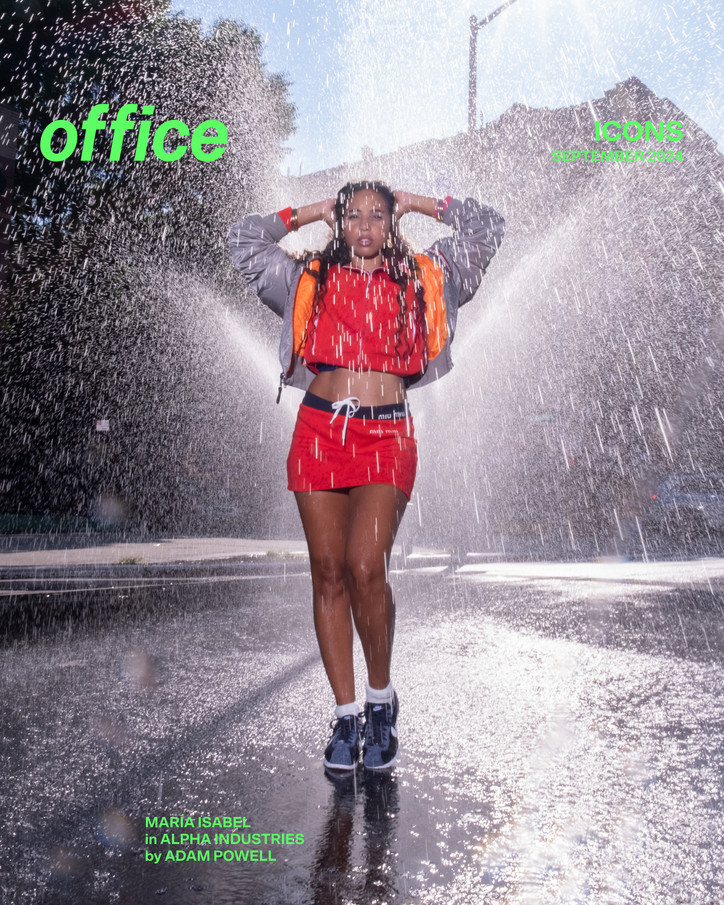
MARIA wears JACKET by ALPHA INDUSTRIES, TOP and SKIRT by MIU MIU, SHOES by NIKE, SOCKS stylist's own
Calling in from a sunny Los Angeles, María reflects on how much she’s changed since releasing her first two projects, her 2020 EP Stuck in the Sky and 2021’s i hope you’re very unhappy without me—reflections on love, loss, and long-distance relationships, which immediately drew attention for their introspective lyricism and bilingual fluidity. "A lot of the time, I get messages from listeners saying they found a song at a really hard time, and it helped them get through something. Even with my first EP, which was all about long-distance heartbreak, people have told me that it resonated with them in the same way," she muses on the emotional resonance of her previous projects and her thought process as she works on the next.
"I feel like I’m letting go of things I had envisioned for a long time, but in a way that’s been positive," she continues. "Loss and change are hard, but I feel lighter, and I’m a better version of myself now." The lessons she’s learned, she explains, continue to ripple through others. "That’s the most gratifying feeling—knowing my work isn’t just for me, but that it can help at least one other person."
Read our interview below.
Before becoming a full-fledged musician, you were a poet. What inspired the shift to pursue music full-time?
They were always separate loves for me. Writing felt natural because I loved reading, and it was my first way of expressing myself and I grew up singing, whether in talent shows or my church choir — but always singing other people’s songs. It's funny looking back because I don't know why it took me until adulthood to connect the two.
After college, I realized music was what I really wanted to do, and that I wanted to sing my own words. Going to the studio helped me take what I'd been writing for years and put music to it. That's when the two finally made sense for me.
Do you remember the first song you ever wrote?
I do, I’d there are two "first" songs. Technically, the first was when I was five. I got stuck on a line, "Won't you get out of my dreams?" and I just repeated that for two minutes. I was really proud of it at the time. As an adult, the first song I wrote was for a songwriting class — it definitely wasn't great, but it was a key moment. I just took one of my poems and played simple piano chords under it for the class, which was my first time connecting the two in front of people.
Are there any daily rituals that you’ve followed since then?
Yeah. I have two daily rituals: calling my mom and hitting my snooze button at least twice when I wake up in the morning. [Laughs].
What’s the biggest lesson you were taught that still rings true to you today?
I think the biggest lesson I was taught is “closed mouths don’t get fed.” You have to ask for what you want, no one knows otherwise.
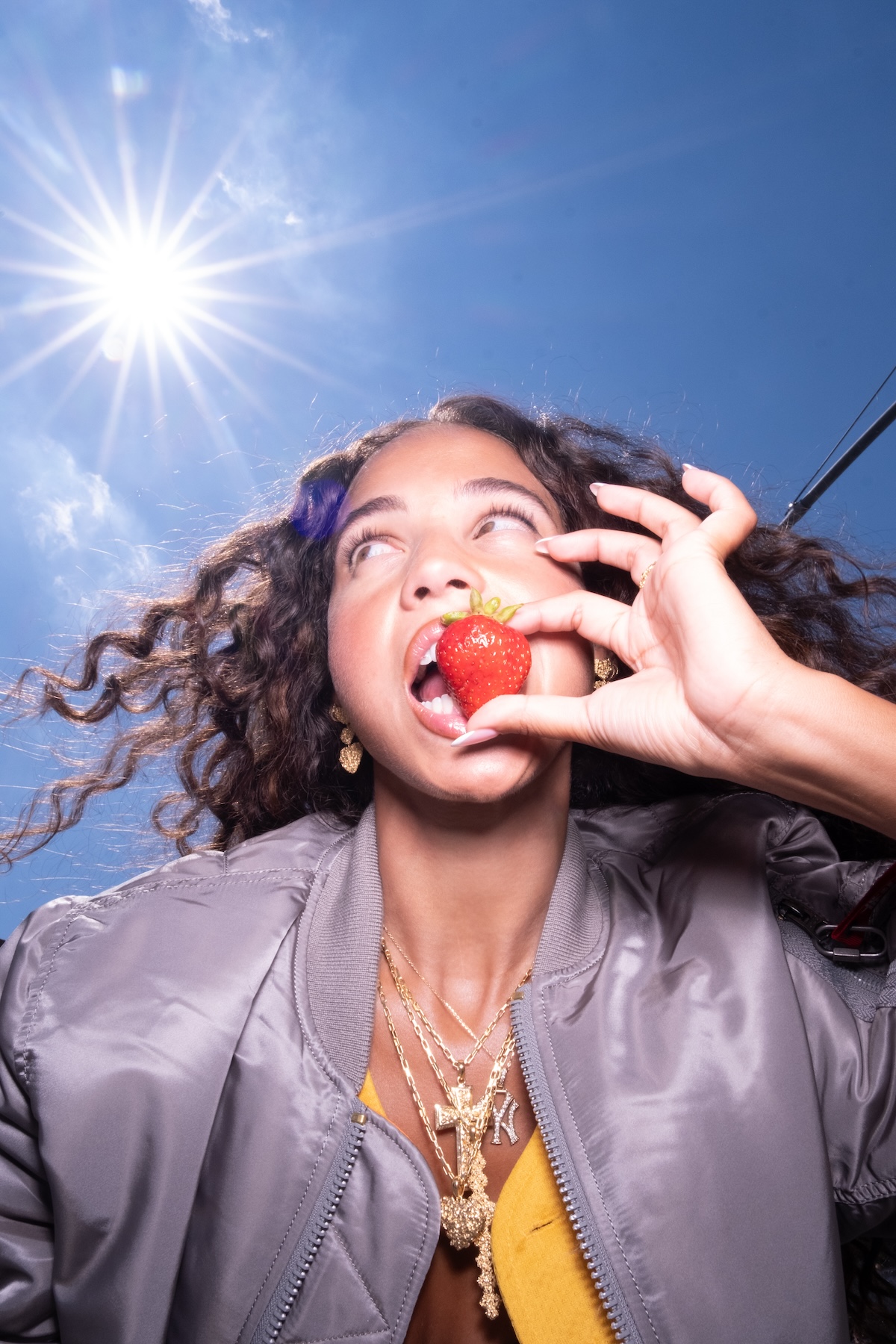
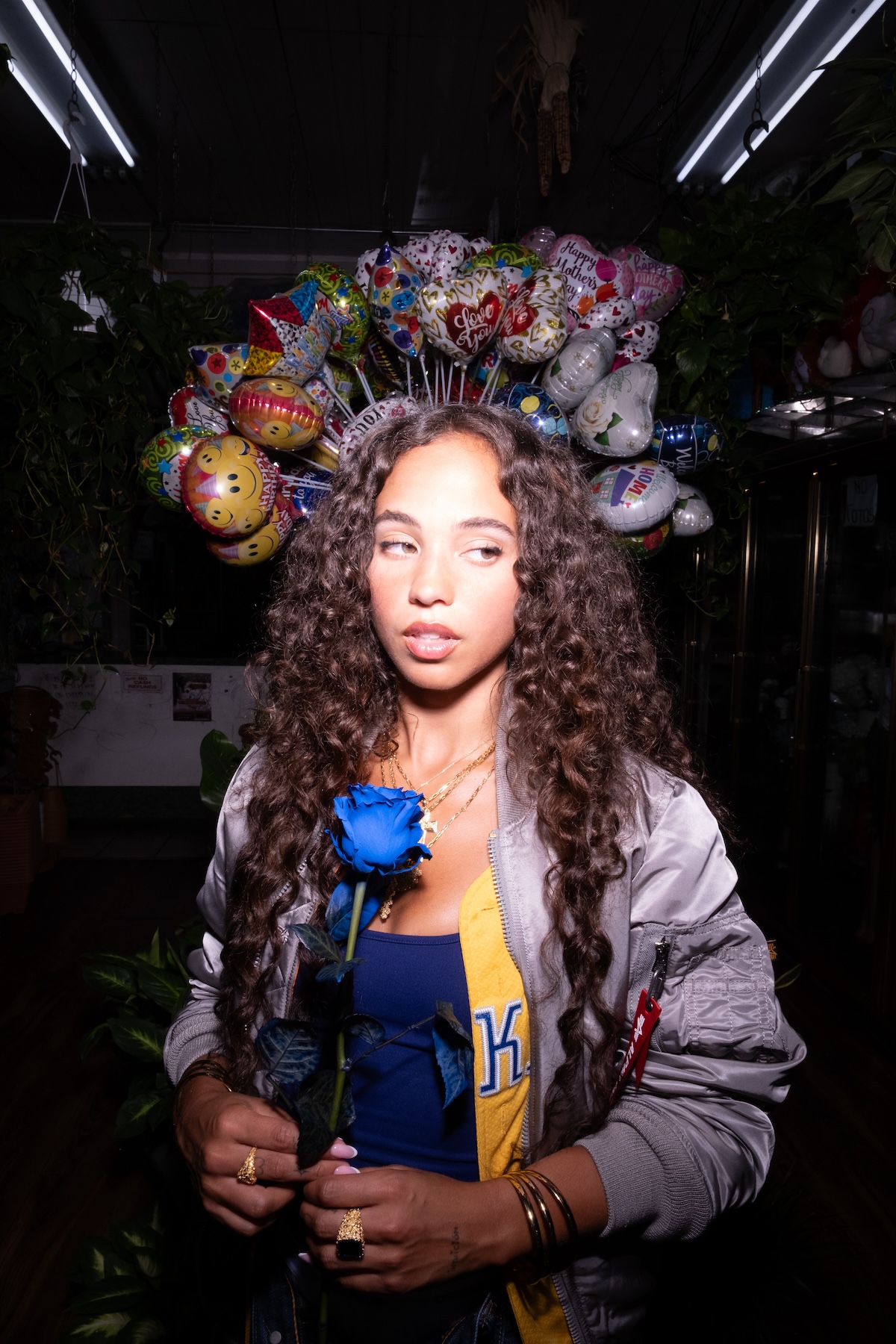
The lyrics in your songs feel very emotionally charged. Do you consider yourself an emotional person?
I'm definitely an emotional person, which is what really spearheaded my interest to write in the first place. At first, it was an outlet for negative emotions, so a lot of my early songs were slow and a bit sad because that's what I was drawing from. That’s changed as I’ve grown. Now, I try to pull from the full spectrum of my emotions. Whether I’m experimenting with genres or themes, I just want to sing about what I know and what I’m going through. It’s been fun to evolve that over time.
I'm just like, Girl, what the fuck were you so sad about? But also... real. I feel like everyone's depression peaks during that time in your life — when you’re like 19, 20 years old. Now I'm like, There's so much more to life. Looking back, it still means a lot to me and I'm grateful other people can find those songs but I've definitely outgrown that way of thinking.
Do you have any role models or artists you look up to?
Absolutely. Alicia Keys was a big one for me. I still think "If I Ain't Got You" is one of the best songs ever written, listening to it for the first time made me want to create something that would evoke that kind of feeling in someone else. I also think her being so New York and quintessential to my experience growing up in the city is definitely part of it. The Diary of Alicia Keys was one of the first albums I really got stuck on and played forever. Lauryn Hill is a big one too. I also always go back to Amy Winehouse — how honest and vulnerable she is in her songwriting really meant a lot to me growing up.
What’s been your proudest career moment so far?
That’s hard, but I’d probably say Colors was a big one for me. I had been watching for a while and discovered so many people there, and I really started my career as Covid-19 took over so a lot of what was happening for me was only online and not all tangible up until that point. Recording that moment live and seeing it come out to an audience bigger than my own was really great.
In the same vein, going on my first headline tour. It was probably the New York stop at Baby’s All Right. There were two sold out nights and my entire family was there, even people I’d grown up with that I didn’t really know came out so it was such a full circle moment, being from New York and really feeling that support where I’m from.
A lot of your songs are bilingual — did you grow up learning both English and Spanish simultaneously, or was one your first language? Do you consider yourself a true heritage speaker?
Spanish was my first language just because both of my parents are from the Dominican Republic, and although my parents were already living in New York when they had me, we went back and forth a lot as they started to lay their roots in the city. I also grew up with my grandparents and aunts and uncles, but my parents’ English was pretty advanced compared to everyone else so English came right after. I don’t remember a time when there wasn’t both. I’m definitely a heritage speaker but it’s so funny — I see all these memes that are like “being bilingual means you’re just bad at two languages,” and it starts to feel like that after a while.
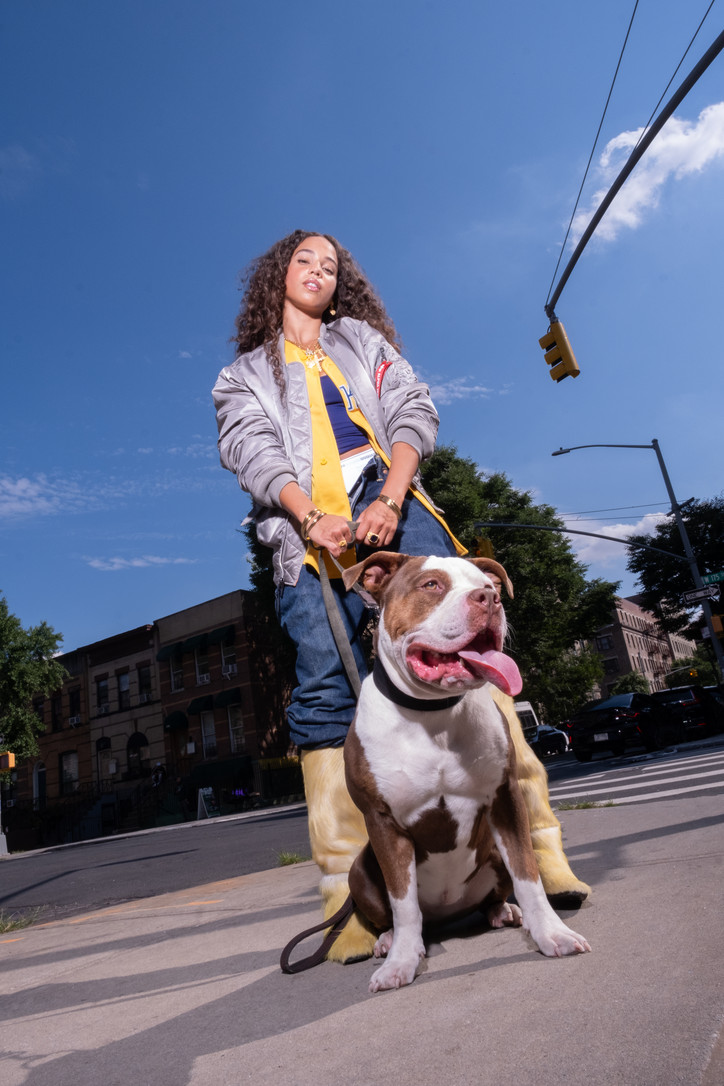
How is it visiting DR now?
I was just there actually. My parents had been out there for a few weeks and both of my mom’s parents and dad’s mom are still in DR so we just hung out with them for a while. I think so much of why I love the Dominican Republic is that, while everywhere changes, the rate of change there is so much slower than in America.
I’m 28 now so it’s different from when I was 4 and living there, but it still feels like you’re going back in time and to a simpler way of living. I used to hate it as a kid, because that’s when everyone started having phones so I’d go and never have service and be annoyed. But now I go back and I’m like, This is incredible, no one can reach me. I’m going to sit in this rocking chair for hours.
Do you have a similar experience when you visit Corona now that you’re living in LA? Has the neighborhood changed much?
It’s actually kind of similar to going to DR in that way. It’s definitely changing — I was jarred the first time I saw a Starbucks pop up — but I feel like it’s still much slower than other parts of NYC.
What’s your favorite spot in Corona?
My favorite spot in Corona — well in New York really — is probably Flushing Meadow Park. Growing up, that's where all the family barbecues, events, and birthdays were. If my parents had a day off from work that’s where we’d go to hang out. Growing up going to Mets games and working at the US Open, that was the center of my world for a lot of my childhood.
Do your early experiences getting together with family in the city inform your approach to shows and performances as an artist?
Yeah, a hundred percent. It’s funny you say that because I saw a post on Twitter yesterday of a group of people watching an MMA fight on a projector on a street in Brooklyn. I just feel like you don't see that anywhere else unless it's a planned event — it’s such a New York thing. That’s why performing at Baby’s was such a pivotal moment for me. I want to feel connected to everyone when I’m performing live, talk in between songs and interact with the crowd in a way that’s genuine and it was easy to do that there.
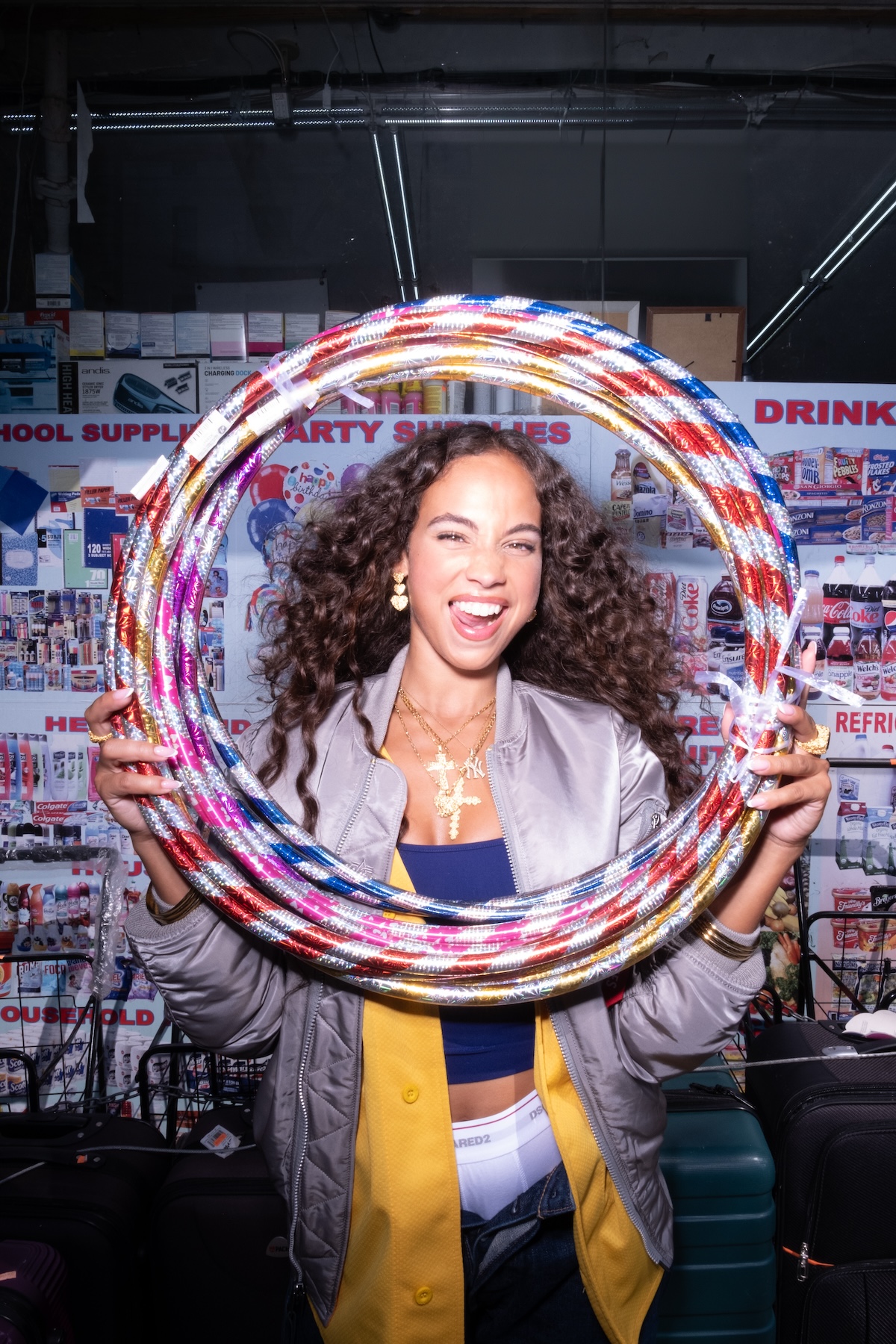
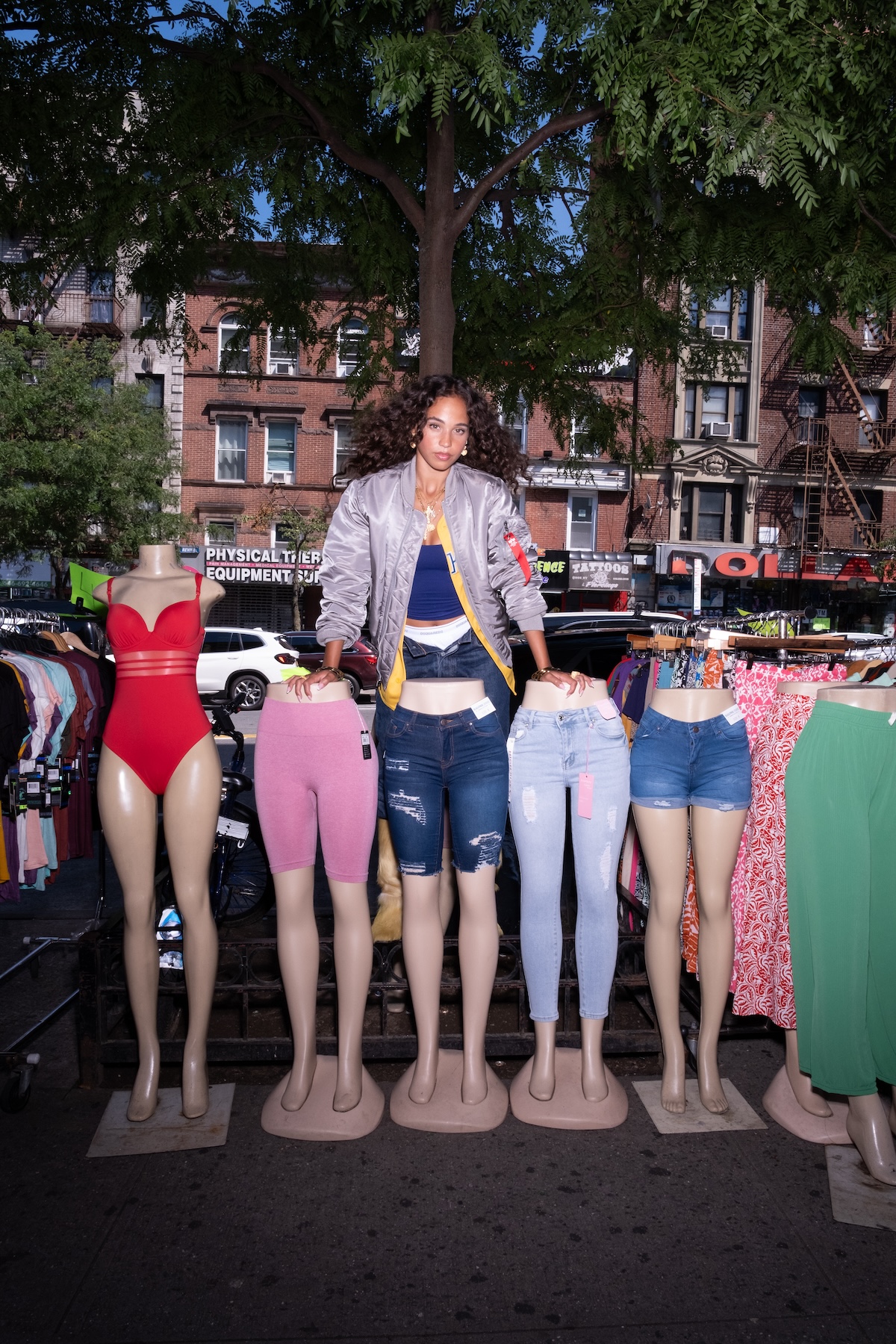
Do you ever feel a tension between creating things for yourself and trying to make it in the industry, especially with the focus on virality and algorithmic songs?
Totally. There’s this balance between singing being how I make a living and it also being something that I consider sacred and I want it to remain that way always. My reminder to myself is basically what we were talking about before, being able to go back to a Lauryn Hill classic or something similar.
I also feel like people are tired of the bullshit already. It feels like we’re reverting to that authentic way of creating. This generation is good at seeing through what’s fed to us. For me, it connects when it’s genuine and I know that’s what’s gotten me this far.
How often are you in the studio these days anyway? Are you working on anything you’re excited about?
I have been in the studio a lot. From a listener's perspective it must feel like so long since I’ve released music, and honestly, it feels long to me too, but I’m having so much fun just trying new things and I can't wait to share.
It’s also been so nice to just live my current life and to have all of these new experiences to draw from — when you’re dropping a project, going on tour, doing interviews, you don’t really have time for that. I feel like I've lived a new lifetime in the last year or two.
Where are you finding inspiration currently in this new chapter or this particular chapter of your life?
A lot of reading and watching a million things. The last book I finished was The Year of Magical Thinking by Joan Didion. It’s so heartbreaking, I was like sobbing over this book. I had no idea what I was getting myself into. And she’s an incredible writer.
And I feel so similar now. What used to feel like the end of the world to me just doesn’t anymore. I’ve been going through all of my experiences with that mindset. The way she goes through those things and keeps living. I know I have to keep living mine until the end.
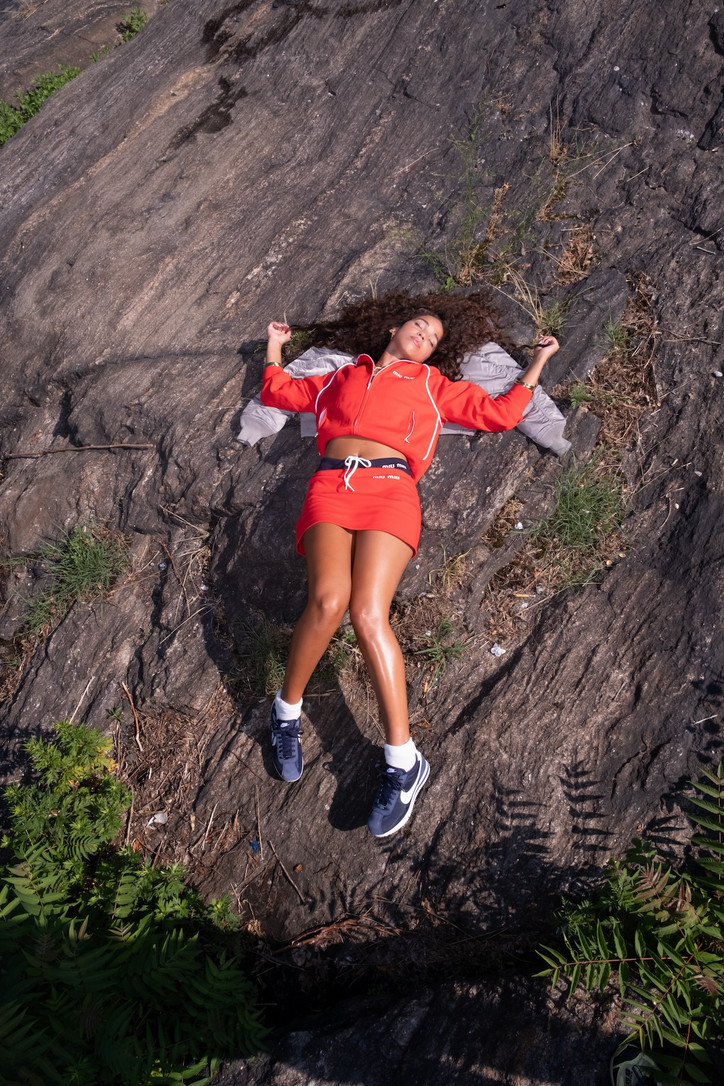
What are you most looking forward to in this chapter you’re entering now?
On the career side, getting to share the new music and figuring out how I want to do that. In a personal sense, new experiences and new people. I know I’m still grieving things, but I have a much easier time letting things go. I understand that people are in my life for a reason, and things just can’t last forever. It’s impossible. It’s funny too because I used to be that kid that was like, You’re my best friend, you can’t go anywhere, I can’t do anything without you, so a lot has changed.